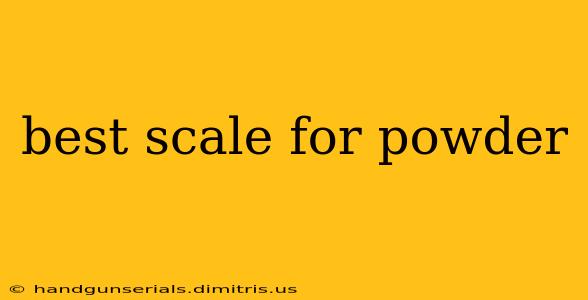Weighing powder accurately is crucial in various applications, from baking and cooking to scientific experiments and crafting. Choosing the right scale depends heavily on your needs, the level of precision required, and your budget. This guide will help you navigate the options and find the best scale for your powder-weighing needs.
Types of Scales for Powder
Several types of scales excel at accurately weighing powders, each with its strengths and weaknesses:
1. Digital Kitchen Scales:
- Best for: Baking, cooking, and general household use where high precision isn't paramount.
- Pros: Affordable, easy to use, often compact and lightweight, typically feature tare function (zeroing out the weight of a container).
- Cons: Lower precision compared to other types, may not be suitable for very fine powders or extremely small quantities.
2. Precision Scales (Analytical or Laboratory Scales):
- Best for: Scientific research, pharmaceutical applications, precise crafting (jewelry making, etc.), situations demanding high accuracy and repeatability.
- Pros: Extremely accurate, often measure to the thousandth of a gram (milligram), feature various calibration options for optimal performance.
- Cons: More expensive than kitchen scales, require careful handling and calibration, may be overkill for less demanding tasks.
3. Milligram Scales:
- Best for: Extremely precise measurements where even small variations are critical, common in scientific research, pharmaceutical compounding, and certain artistic applications (e.g., miniature painting).
- Pros: Highest level of precision available, capable of measuring incredibly small quantities of powder.
- Cons: High cost, require meticulous care and maintenance, often more sensitive to environmental factors (vibrations, drafts).
Factors to Consider When Choosing a Powder Scale
Beyond the type of scale, several other factors influence your choice:
1. Capacity:
Consider the maximum weight you need to measure. If you're only weighing small amounts of spices, a lower capacity scale will suffice. For larger quantities, a higher capacity is essential.
2. Readability (Precision):
Readability refers to the smallest increment the scale can display. Higher readability means greater precision. Consider the level of accuracy needed for your application. Gram precision is suitable for baking, while milligram precision is needed for scientific applications.
3. Tare Function:
The tare function allows you to zero out the weight of a container, enabling you to weigh only the powder itself. This is a crucial feature for accurate measurements.
4. Calibration:
Some scales offer automatic calibration, while others require manual calibration using calibration weights. Automatic calibration is more convenient but often more expensive.
5. Durability and Material:
Choose a scale constructed from durable materials that can withstand daily use. Stainless steel is a popular choice for its ease of cleaning and resistance to corrosion.
Choosing the Right Scale for Your Needs:
-
Baking/Cooking: A basic digital kitchen scale with a capacity of at least 500g and gram readability will suffice.
-
Crafting (Jewelry making, etc.): A precision scale with a capacity of 100g and at least 0.01g readability is recommended.
-
Scientific Research/Pharmaceutical Applications: An analytical or milligram scale with high accuracy and repeatability is essential. Specific requirements will depend on the application.
By carefully considering these factors, you can choose the best scale for your powder-weighing needs, ensuring accurate and reliable measurements every time. Remember to read reviews and compare prices before making your final decision.

